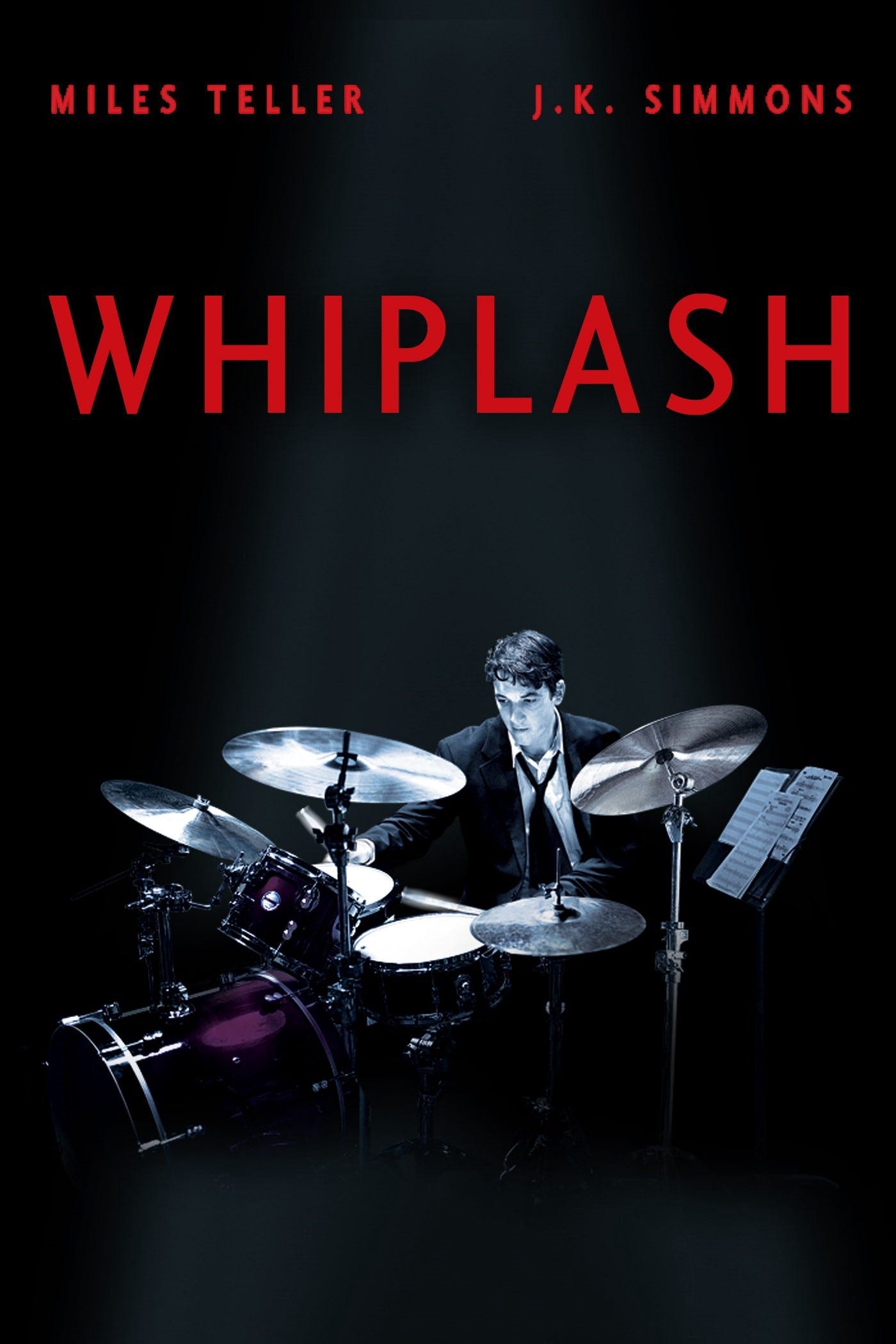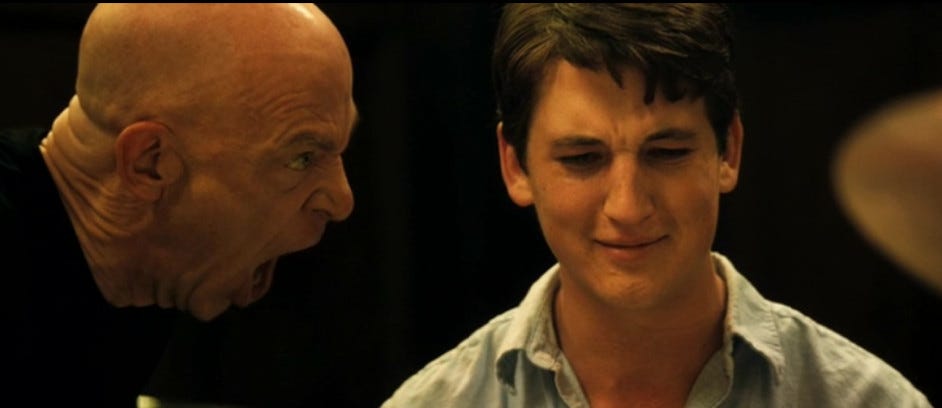‘Whiplash’ Review: A Relentless Strive for Perfection
To kick off the new year, I decided to sit back, relax, and watch a movie. Out of all the possible films to view, Whiplash was the one.

The critically acclaimed drama was released in 2014 and is Damien Chazelle’s sophomore invention in the film industry. Both writer and director, Chazelle created an exhilarating yet intense film that establishes him as one of the best in the business.
Whiplash follows first-year Shaffer Conservatory student Andrew Neiman (Miles Teller) on his journey to becoming a world-renowned jazz drummer. As he is practicing his craft one day, profane jazz instructor and bandleader Terence Fletcher (J.K. Simmons) discovers him and invites him to join the Studio Band as an alternate. As Andrew’s life begins to change, his passion for drumming soon becomes a spiraling obsession in the pursuit of perfection. Through the use of disturbing and abusive training methods, Fletcher puts Andrew through emotional and physical agony.
WARNING: Spoilers ahead.
In the beginning, Fletcher presents himself in a calming, authoritative manner. Andrew takes a liking to him and is optimistic about the opportunity to join his jazz band at the school. Once Andrew and viewers catch a glimpse inside the rehearsal, it all goes downhill from there.

The intensity of Fletcher’s behavior towards his students is unnerving — a teacher should never be this ruthless or heartless. Some may say he acts this way to bring out the best in his students, but in reality, Fletcher behaves this way because he doesn’t want his precious reputation tarnished.
Although Fletcher is incredibly hard to work with, Andrew still wants to work with him. Throughout the film, he “motivates” Andrew, breaking him down piece by piece and pushes him towards the world of excessive anxiety. Andrew wants to succeed, and he will do anything to prove himself to Fletcher.
Andrew spends all of his free time practicing; as he practices, he curses himself for not playing the notes correctly. He continues to practice until he is drenched in sweat, blood dripping onto his drums and eventually punching through his snare. Based on his actions, this is no longer a passion — this is an obsession of needing to attain perfection.

Once Andrew earns his spot as core drummer after a grueling five-hour session, he is thrilled about the next competition. However, he goes through serious trauma along the way. First, the bus Andrew rides breaks down due to a flat tire, resulting in him running to a car rental and renting a car. Not only does Andrew arrive late to meet with the band, but he also leaves his drumsticks at the rental office. Andrew somehow persuades Fletcher to wait and races back to get his drumsticks. On his drive back to the competition, Andrew’s car is hit by a truck. He emerges from the wreckage, covered in blood. He doesn’t stick around long, running to the theater, barely making it in time. In the end, Andrew’s injuries prevented him from playing “Caravan,” and Fletcher cuts him from the band. Thus, Andrew attacks Fletcher on stage, resulting in his expulsion.

Although Andrew displays strong perseverance, it wasn’t worth all the trouble. Fletcher never truly cared for him — he enjoyed getting under Andrew’s skin and destroying his love for music. What used to make him happy led to his destruction.
Eventually, Fletcher is fired from Shaffer due to anonymous complaints about his unethical presence. One of his previous students, Sean Casey, suffered from severe anxiety and depression, leading him to commit suicide. The attorney for Sean’s parents and Andrew’s father (Paul Reiser) do not want to see Andrew go down that same path, so they plead for him to testify against Fletcher.
To support his teaching practices, Fletcher states, “I was there to push people beyond what’s expected of them.” Based on what transpires in the film, I would say he was way too harsh. As Andrew notes, there has to be a line. Fletcher was cruel in his ways, verbally attacking students through name-calling and homophobic slurs. He also resorts to physical violence, slapping Andrew across the face multiple times and even hurling a chair towards his face. Overall, Fletcher takes pleasure in humiliating his students and working them to the bone.

I thoroughly enjoyed this film from start to finish. Chazelle, with the help of Miles Teller and J.K. Simmons, created one of the best anxiety-inducing films to date. My heart was racing the entire time, and my mind was blown. There were plenty of twists and turns in this film, especially at the end when Fletcher betrays Andrew at the JVC festival. For some unknown reason, I didn’t see it coming. Though he was insensitive the entire film, this was the moment he proved himself to be cold-blooded.

J.K. Simmons stood out to me the most, as he provided a compelling and obscene performance unlike any other. As Fletcher berated his students, I felt like I was in the room with them. My palms were sweating, my heart rate picked up, and I was nervous that J.K. Simmons was going to come through my screen and yell at me for hours on end. I can see why he received the Academy Award for this film — he deserved it.
Not only was the writing and direction of the film great, but the editing and sound mixing were phenomenal. Tom Cross, the editor of Whiplash, did a fantastic job of assembling moments that demonstrate how Andrew’s body movements while drumming relate to the psychological and inner anguish he faces. Cross was able to set the dramatic and agonizing tone of the movie through his editing. As for sound mixing, this was the star of the film for me. Craig Mann, Ben Wilkins, and Thomas Curley were the sound mixers of the film, and they couldn’t have done a better job. The three blended the sounds of sound effects, dialogue, and most importantly, music stunningly. I was most excited to hear the music; the balance of the volume made the beauty of the music spring to life. Both of these categories of post-production received numerous accolades, including Academy Awards.
Regarding diversity, Whiplash did not go out of its way to promote it. There were a few portrayals of underrepresented groups, such as Andrew’s short-lived relationship with Nicole (Melissa Benoist), a woman of color and the attorney for Sean Casey’s parents, and several musicians who are people of color.
Whiplash was released in 2014 and is rated R for strong language and adult content.

More to explore
By Same Author
Related lists created by the same author





